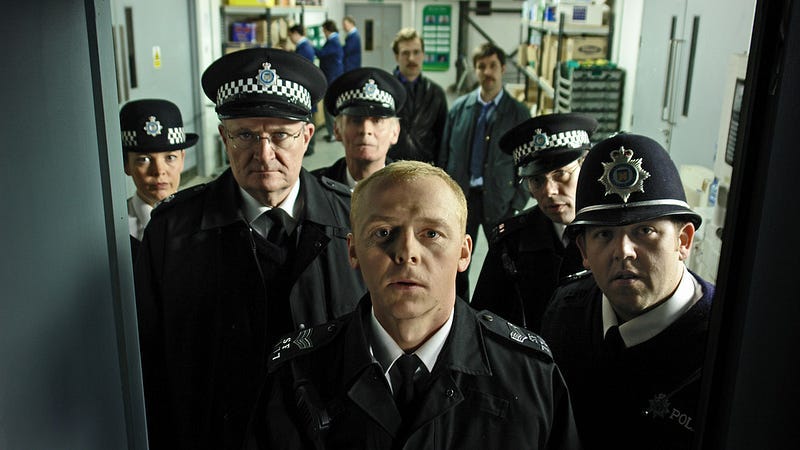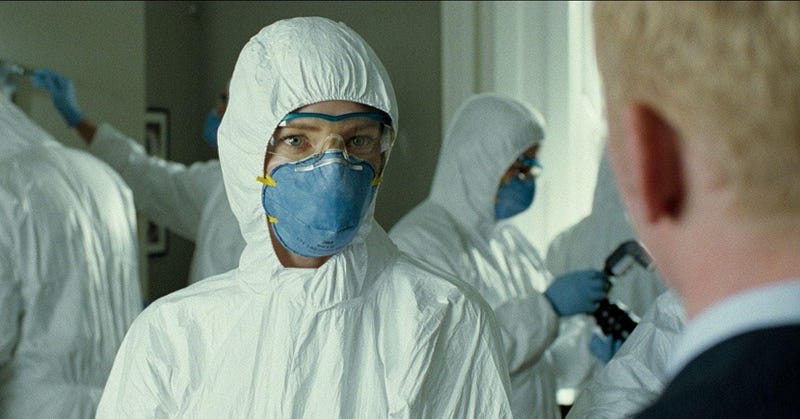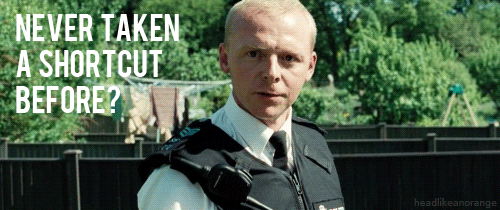Learning to Switch Off — Lessons from “Hot Fuzz”
“You’ve just got to learn to switch off that big melon.” Sound familiar?
“You’ve just got to learn to switch off that big melon.” Sound familiar?
The classic 2007 film, written by Edgar Wright and Simon Pegg, follows an exceptional London police officer (Nicholas Angel) who is overly immersed in his job. It’s all he thinks about, much to the detriment of every relationship he’s ever had. We see it pretty early on with his recent ex-girlfriend Janine:
JANINE: See that’s it. It’s only ever about the job. It’s all you care about.
ANGEL: That’s not true.
JANINE: No, you’re right, you do have that rubber plant.
ANGEL: It’s actually a Peace Lily.
JANINE: You just can’t switch off Nicholas. And until you find a person you care about more than your job, you never will…
As remote roles continue to grow, it’s easy to always “be on,” especially because our phones contain all messaging services on which we could possibly be reached. Give yourself a quick gut check. Do you know how to “switch off?”
If you’re like me, companies blurred that line further and further over time. As Insider points out, many of us have been primed to never switch off.
Signs you may need to learn to switch off:
Never taking PTO
Thinking everything will fall apart if you’re not there
Working 60+ hours a week
Missing activities with friends or family for work-related activities
Can’t stop thinking about work
If you’re plenty happy never switching off, then more power to you. I’d remind you that there are only so many hours in a day, so as long as you are spending those how you want, then go for it. For others, read on and let's see if we can learn anything from Hot Fuzz.
You Are Not Your Job
Unless you choose for it to be the case, your job does not define you as a person. When you think back 10 years, did you want to be what you are now? Do you have a clear separation of where you stop and your job begins? If not, it may be time to think about what that separation looks like.
If you are an entrepreneur or an ambitious upstart, the line may be a bit blurrier for you. Nicholas Angel was also extremely ambitious and dedicated:
“In the last twelve months alone, has received nine special commendations, achieved the highest arrest record for any officer in the borough and sustained three injuries in the line of duty, most recently in December when wounded by a man dressed as Father Christmas.”
The ambition and dedication soon lead to his life falling apart. His peers respect him, but while sitting down with the Chief Inspector, he learns he is too good at his job:
While hyperbolic, it’s a good example of how Nicholas’ inability to switch off has made him so good at his job that he is putting himself and others out of a job.
Nicholas has spent so much time improving his craft that without his job, he has no sense of place or purpose. Going back to the Insider article noted above, you also have to wonder if he was continually rewarded for the extra efforts, prodded to be spectacular until he started making everyone look bad.
In other words, not knowing how to switch off might not only be on Nicholas, and it might not entirely be your fault either.
Find Something Mindless You Enjoy
At a peak in the story when it seems like Nicholas is losing his mind, he and Danny spend a night at the pub, then wander back to Danny’s flat. Down on himself, Nicholas thinks his problem is unsolvable.
Danny opens the door to a whole new world for Nicholas, the power of movies. It’s key here to point out that Nicholas then lets himself get completely sucked into Point Break and Bad Boys II. He’s not idly flipping through his notes, or checking things on his phone, he is immersed and totally switched off. What might that activity be for you?
Some “switching off” activities to explore:
Reading a book
Playing video games
Meditation
Drawing
Listening to or creating music
These activities still stimulate your brain (more on that later), but will help you be away from your work, both mentally and physically.
Don’t Do It Alone
In Hot Fuzz, it takes a new friend to help Nicholas switch off, and as with most things in life, finding someone else to do this with adds a layer of accountability.
It might be scheduling a regular game night, or a certain day you always get lunch with someone. Setting time aside makes you much more likely to observe the time removed from your day-to-day job.
Start small by letting your accountability buddy know when you’re going to take a break. If you’re in-office, walk somewhere and don’t look at your phone while you’re gone. If you’re remote, wander away from your office for thirty minutes and don’t look at your phone. Force yourself to create some space, and let your friends know when you do.
When I was a freelancer, I would frequently work late into the evening (a byproduct of procrastination and overworking), until I’d finally had enough. My wife became my accountability buddy and if I said I was going back to my office we would discuss if it was because it was necessary or because I wanted to. Even that small discussion was enough to jolt me out of my refusal to switch off.
The Power of Switching Off
It’s not only effective to turn off for your non-work life, your brain is more capable of processing problems when you switch off. This is called the Default Mode Network, or DMN.
The Cleveland Clinic reports that “taking breaks can improve your mood, boost your performance and increase your ability to concentrate and pay attention.” Outside of mood boosts, those who take more breaks tend to have improved motivation toward long-term goals.
As a software engineer, I’d frequently use walks as a way to let my mind wander and stop thinking about a complex problem. Same today in management, switching off helps me process future-facing problems, especially around data. There have been many “aha” moments that didn’t come to me while staring at a computer screen, and science seems to back that up.
Final Thoughts
If you’re feeling like the Sherriff of London, and worried you may be too attached to your work, try stepping away for a bit. Take that PTO, turn off all notifications, and don’t check in at all. The work will still be there tomorrow.
Start small, let someone know you’re working on switching off, and go easy on yourself. It may be an easy change or one that’s extremely difficult, but you will thank yourself later for trying.









